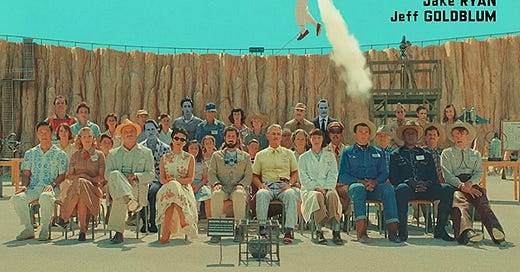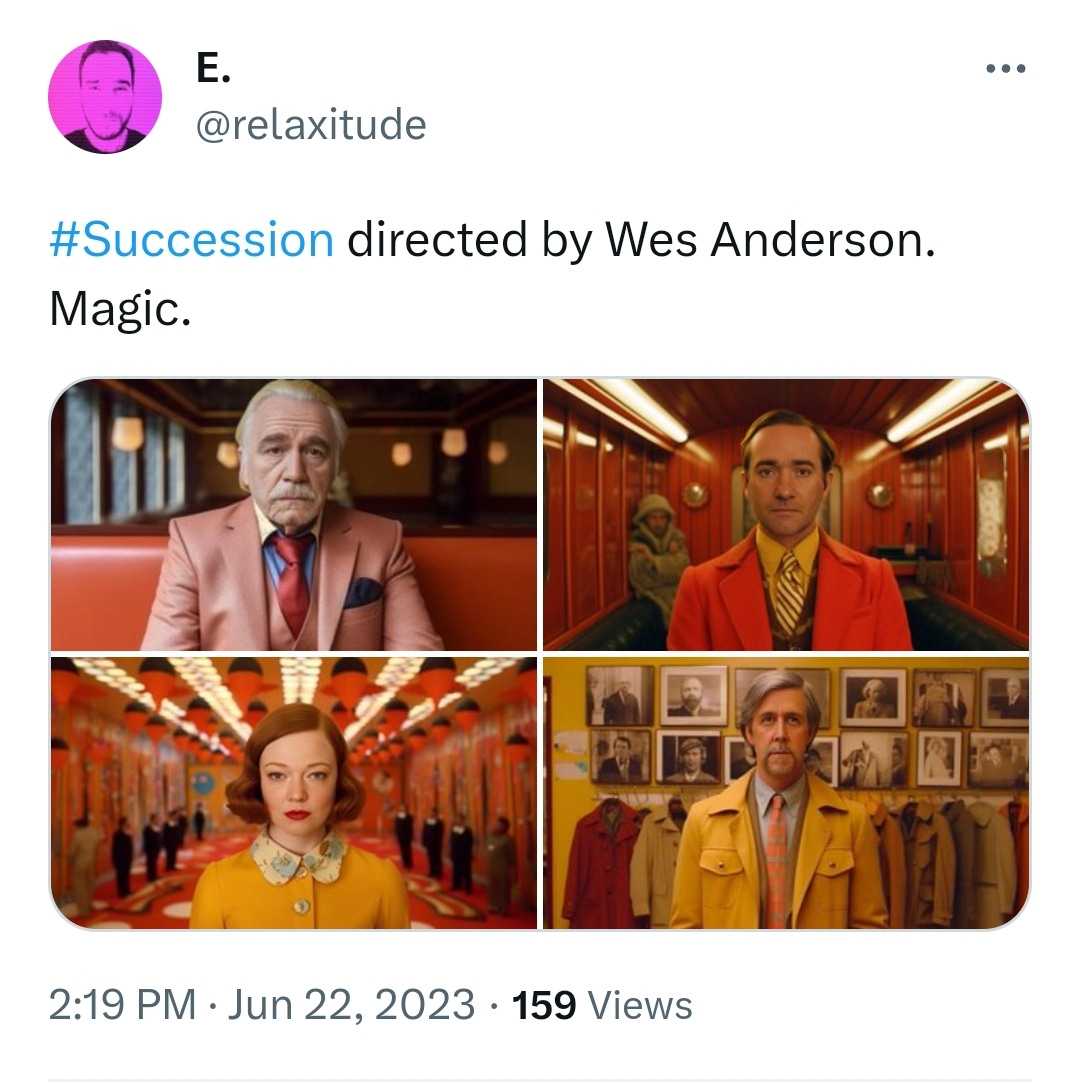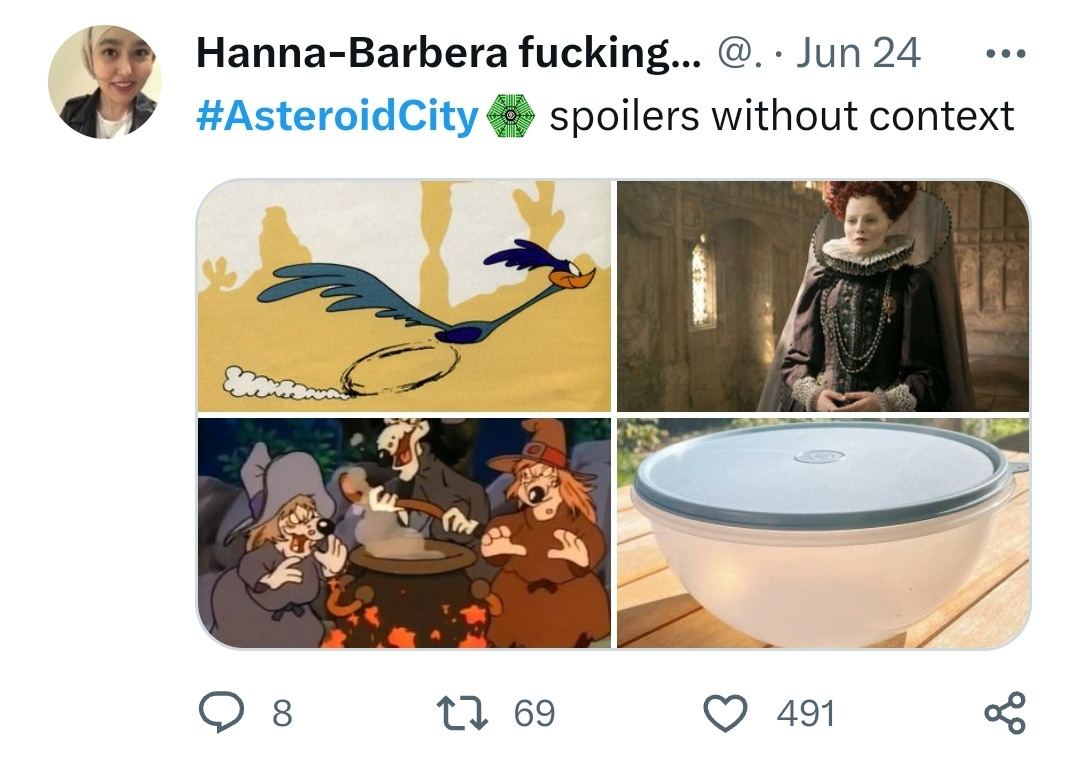Directed by Wes Anderson
Year: 2023
Language: English
Shaun’s Score: 3.7/5 ★
Before Watching:
An actual conversation I had:
“Would you want to go to the Asteroid City premiere with me this week?”
“Sure, I’ve been seeing ads for that movie everywhere.”
“Have you seen any of his other films?”
“I don’t think so, who’s the director? I just like the trailer because it reminds me of the ‘accidentally Wes Anderson’ TikTok trend.”
Memes aside, it’s refreshing to see Wes Anderson transition from an ironic favorite to just a regular favorite. His style has drifted more freewheeling over the years, but his latest release is a reinvigoration of the terse narrative form that gave him his start. As with all of his works, Asteroid City delivers bold color palettes, unflinching symmetry, and quirkiness, all pinned together through understated, speedy dialogue. The film has layers, and enough stars to leave you seeing stars—seriously, does Wes Anderson really have this many friends in Hollywood or is he just an Ozempic dealer?
As Bryan Cranston’s Rod Serling knock-off informs us in the opening scene, Asteroid City is a fictional play, covered on a TV broadcast, inside a movie—it’s a regular turducken of repressed acting. The audience is volleyed back and forth between the television studio where we see documentary footage of the play’s inception and the colorful setting of Asteroid City1 (a California-Nevada-Arizona 1950s desert town2). There, a Junior Stargazers convention has assembled families from far and wide to celebrate their children’s astronomical achievements and revel in the love of space, all while sipping vending machine martinis. Parents like combat zone photographer Augie Steenbeck (Jason Schwarzman3) and distraught starlet Midge Campbell (Scarlett Johansson) are greeted by the likes of the visor-donning motel manager (Steve Carell), scientist Dr. Hickenlooper (Tilda Swinton), and military emcee General Grif Gribson (Jeffrey Wright). Amidst the nerdy, dry-washed revelry of the Wild Wild Wes(t), something unexpected challenges everyone’s understanding of the very cosmos they love so much, and pushes these already emotionally fraught characters into further isolation and reckoning.
Asteroid City has many interpretations, but one that I gazed through the telescope is how humans react to seismic changes in our world and our understanding. Latent passions reach escape velocity, curiosity and fear trade off in a tango, and personal connection somehow finds a way—this is especially evident during a “quarantine” sequence in the film, which feels like a not-subtle dig at COVID-times. Several of Campbell and Steenbeck’s conversations are held at a distance, through windows that look suspiciously like Zoom calls.
Asteroid City doesn’t quite match the narrative brilliance of The French Dispatch (2021) or the cinematic perfection of The Grand Budapest Hotel (2014), but it does beautifully synthesize Anderson’s sensibilities. Both in this recondite desert town and in the TV studio where we witness its inception, we’re able to zoom out on Anderson’s legacy while also zooming out on our place in the universe. If you already have the bug, Wes’s latest film will feel out of this world; if instead you can’t stomach his aesthetics, Asteroid City is unlikely to pull you into orbit.
Asteroid City premiered In Competition at the 2023 Cannes Film Festival. It is now available in theaters worldwide.
After Watching:
Why does Augie burn his hand? It was preemptively discussed by Augie’s actor (Jones Hall (Schwarzman)) and the fictional writer Conrad Earp (Norton), but they certainly don’t seem to understand why either. In fact, nobody seems to know—is it his melancholy boiling over, or perhaps an attempt to “wake up” from his dreams, or is it just because that’s what the script says? Hall’s search for an answer hints at a central theme of the film—why does anybody do anything? The banter of actors admitting “I don’t understand the play” is simply code for “I don’t understand life”, which is especially true when we’re ejected into isolation or confuddled by alien interlopers.
Most audiences don’t gravitate towards Andersonian shenanigans for philosophy, but for corduroy and whimsy. They enjoy the Swiss-watch paradigm of formalism, the snazzy dollhouse sets and retro Goodwill-bin props. Asteroid City delivers these, albeit through a box inside another (Fantastic Mr.) box. Anderson frames his story as a play inside a TV program not just to be annoying, but as *artifice*—we use fiction to process our feelings, to question our surroundings. He gives the people what they want; in this case, they want to feel like they’re back in a Polaroid world, untarnished by modern technology and fueled only by ennui.
Yeah, Asteroid City can be pretty slow and dense (some individuals in my screening certainly didn’t see “you can’t wake up if you don’t fall asleep” as an obstacle). But, it’s also a touching story about life in the face of uncertainty. Like the brainiacs at the convention, we too will never be able to find neat, satisfactory answers to the universe’s mysteries, and we’re also unlikely to ever “understand the play.” But, so what? We bury our dead near unmarked cacti and our cosmic dance shuffles on, allowing us to meander through and choose our paths as best we can. Sometimes, we take the road Wes traveled by, and that has made all the difference.
A joke name—it’s more of a small dusty village than a city, and the “asteroid” is actually a grapefruit-sized meteorite.
But filmed in… Spain? Ay, caramba.
Yeah, he’s playing a father in this movie. How old are we now?











